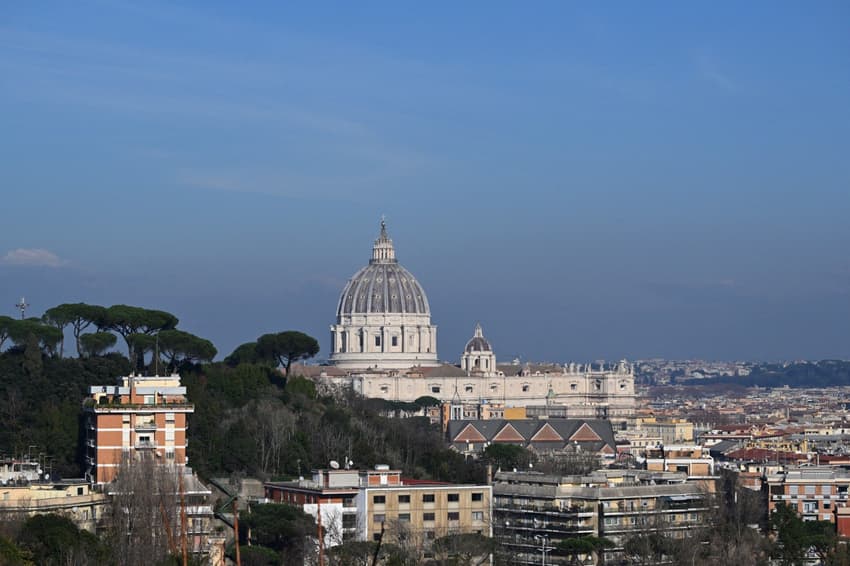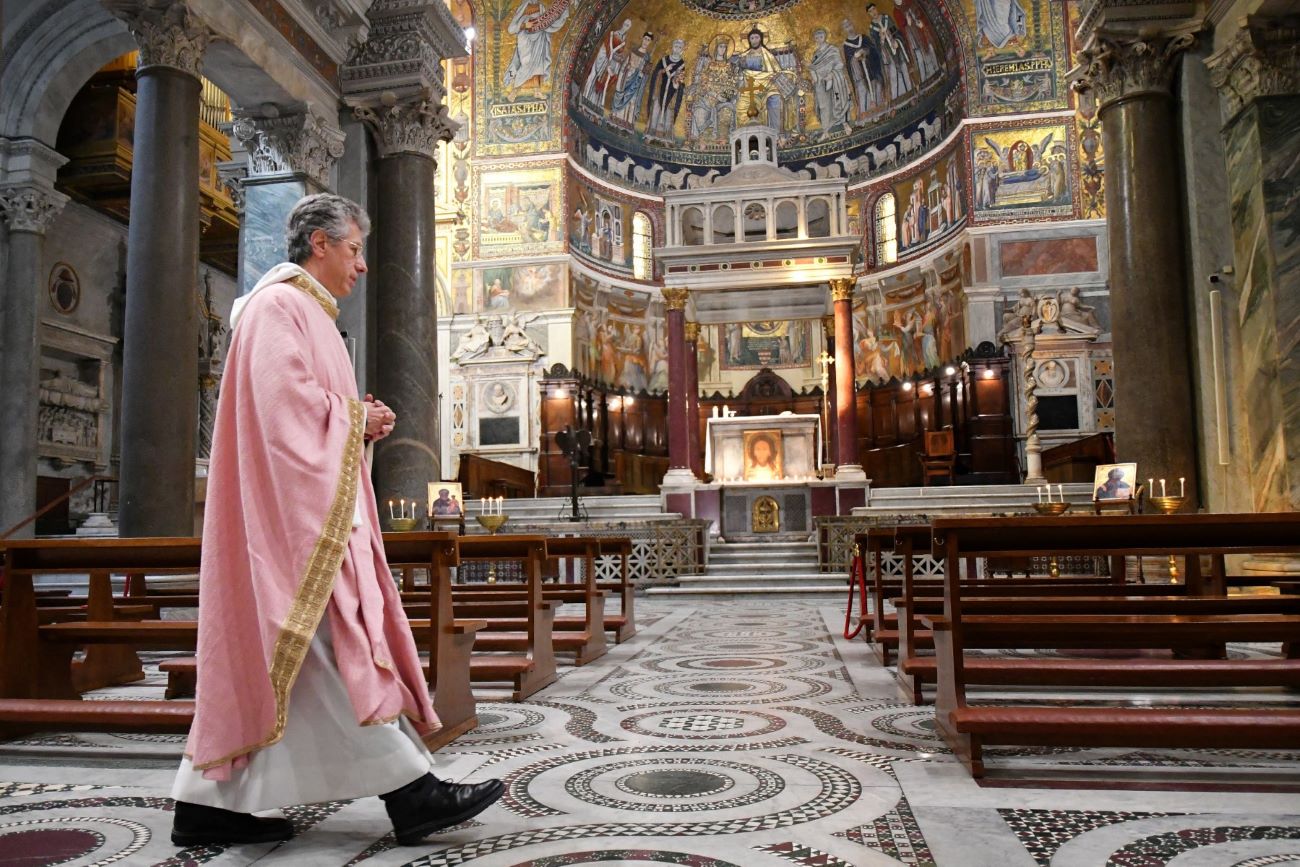ANALYSIS: How Catholic is Italy really?

As Rome prepares to host the 2025 Jubilee, interest in Catholicism is declining in the country - but is the church still inextricably linked to Italian culture?
Italy is frequently described in news reports as an overwhelmingly Catholic country. And some 80 percent of Italians identify as Christian, according to the latest data from the Pew Research Center. Of those, 50 percent say they regularly attend church - the highest percentage in Western Europe.
But while this data confirms Christianity as prevalent in Italy, it fails to illustrate the generational gaps: according to another survey conducted by Ipsos in 2023, younger Italians born between 1997 and 2012 (which the survey's authors label 'Gen Zers') are 21 percent less likely to be religious than those born between 1946 and 1964 (labelled 'Boomers' in the survey.)
The Ipsos survey also found an increase in young Italians believing in a "higher power" as opposed to a specific deity.
The trend of youth not identifying as Catholic should not come as a shock. Over the years, there have been a number of signs pointing to a decline in Catholicism in Italy, including a 16.5 percent decrease in priests being ordained between 1990 and 2020, civil ceremonies becoming more popular than church weddings in northern regions, and only 19 percent of Italy's practising Catholics attending church weekly.
Theologian and author Don Matteo Armando said last year that the link between the Church and younger generations was as weak as ever in history.
"Certainly the greatest evidence regarding the findings of religious sentiment among Italians is highlighted in the growing indifference and detachment of younger generations with respect to Catholicism and Christianity," he said in an interview with Il Mattino.
Italy is a secular state by law. At no point does Italy's constitution indicate Catholicism as the national religion. In fact, it even goes one step further and promotes religious freedom under Article 19. There is no Church of Italy like there is a Church of England. The state's religion is not Catholicism.
READ ALSO: Pope addresses growing conflict within the church
But does legislation necessarily reflect social behaviour, traditions, and customs?
There is of course a long Catholic history in the country. Italy's first constitution, the Albertine Statute, laid out Catholicism as the national religion. What's more, senators have in recent years questioned the clarity of the current constitution in defining what 'secular' means, claiming that France's constitution outlines secularism in a clearer way.
And while the constitution states that laws must be secular, blasphemy remains an offence: fines of up to €309 are in place, though they are not handed out frequently.

An empty church in Italy. Photo by AFP/ Alberto Pizzoli.
Italy's current prime minister, Giorgia Meloni, also identifies as a Catholic. During her election campaign in 2022 she declared: "I am a woman, I am a mother, I am a Christian." The last part of this sentence, which was reported in newspapers worldwide, does not exactly scream secular constitution.
Meanwhile, it is not unusual to see crucifixes on the walls of public offices such as police stations or town halls. Saints' days such as Santa Lucia, Santo Stefano, and All Saints are also extremely popular and some of them are public holidays.
It is also important to note the north-south divide: people in Italy's southern regions say they go to church far more frequently than those in the south. According to data from Italian statistics bureau Istat, 46.8 percent of people in Tuscany said they hadn't been to church at all in the previous year, compared to only 17.5 percent in Campania.
READ ALSO: Pope warns Italy's priests to stop charging for weddings and funerals
Overall, 16.4 percent of people in central Italy and 18.8 percent of people from the north said they went to church once a week. In the south, the figure was 23.2.
While the Istat data doesn't distinguish between Catholics and other Christian denominations such as Protestants, other Christian denominations account for only 4 percent of Italy's religious composition.
This north-south divide here is generally thought to be down to a number of reasons, including family traditions, and historical cultural differences, but one theory is that it's due to the north and centre being closer to mainland Europe and therefore other religions and cultures.
When looking at law alone, Italy is not a Catholic country. But when analysing society, it is. There are rare occasions when the two match up, such as with public blasphemy laws. Perhaps this apparent contradiction isn't surprising when we consider that the Vatican City towers over and sits within the beating heart of Rome.
Either way, one thing stands out: Italy's younger generations are less interested in Catholicism than ever before.
Comments
See Also
Italy is frequently described in news reports as an overwhelmingly Catholic country. And some 80 percent of Italians identify as Christian, according to the latest data from the Pew Research Center. Of those, 50 percent say they regularly attend church - the highest percentage in Western Europe.
But while this data confirms Christianity as prevalent in Italy, it fails to illustrate the generational gaps: according to another survey conducted by Ipsos in 2023, younger Italians born between 1997 and 2012 (which the survey's authors label 'Gen Zers') are 21 percent less likely to be religious than those born between 1946 and 1964 (labelled 'Boomers' in the survey.)
The Ipsos survey also found an increase in young Italians believing in a "higher power" as opposed to a specific deity.
The trend of youth not identifying as Catholic should not come as a shock. Over the years, there have been a number of signs pointing to a decline in Catholicism in Italy, including a 16.5 percent decrease in priests being ordained between 1990 and 2020, civil ceremonies becoming more popular than church weddings in northern regions, and only 19 percent of Italy's practising Catholics attending church weekly.
Theologian and author Don Matteo Armando said last year that the link between the Church and younger generations was as weak as ever in history.
"Certainly the greatest evidence regarding the findings of religious sentiment among Italians is highlighted in the growing indifference and detachment of younger generations with respect to Catholicism and Christianity," he said in an interview with Il Mattino.
Italy is a secular state by law. At no point does Italy's constitution indicate Catholicism as the national religion. In fact, it even goes one step further and promotes religious freedom under Article 19. There is no Church of Italy like there is a Church of England. The state's religion is not Catholicism.
READ ALSO: Pope addresses growing conflict within the church
But does legislation necessarily reflect social behaviour, traditions, and customs?
There is of course a long Catholic history in the country. Italy's first constitution, the Albertine Statute, laid out Catholicism as the national religion. What's more, senators have in recent years questioned the clarity of the current constitution in defining what 'secular' means, claiming that France's constitution outlines secularism in a clearer way.
And while the constitution states that laws must be secular, blasphemy remains an offence: fines of up to €309 are in place, though they are not handed out frequently.

Italy's current prime minister, Giorgia Meloni, also identifies as a Catholic. During her election campaign in 2022 she declared: "I am a woman, I am a mother, I am a Christian." The last part of this sentence, which was reported in newspapers worldwide, does not exactly scream secular constitution.
Meanwhile, it is not unusual to see crucifixes on the walls of public offices such as police stations or town halls. Saints' days such as Santa Lucia, Santo Stefano, and All Saints are also extremely popular and some of them are public holidays.
It is also important to note the north-south divide: people in Italy's southern regions say they go to church far more frequently than those in the south. According to data from Italian statistics bureau Istat, 46.8 percent of people in Tuscany said they hadn't been to church at all in the previous year, compared to only 17.5 percent in Campania.
READ ALSO: Pope warns Italy's priests to stop charging for weddings and funerals
Overall, 16.4 percent of people in central Italy and 18.8 percent of people from the north said they went to church once a week. In the south, the figure was 23.2.
While the Istat data doesn't distinguish between Catholics and other Christian denominations such as Protestants, other Christian denominations account for only 4 percent of Italy's religious composition.
This north-south divide here is generally thought to be down to a number of reasons, including family traditions, and historical cultural differences, but one theory is that it's due to the north and centre being closer to mainland Europe and therefore other religions and cultures.
When looking at law alone, Italy is not a Catholic country. But when analysing society, it is. There are rare occasions when the two match up, such as with public blasphemy laws. Perhaps this apparent contradiction isn't surprising when we consider that the Vatican City towers over and sits within the beating heart of Rome.
Either way, one thing stands out: Italy's younger generations are less interested in Catholicism than ever before.
Join the conversation in our comments section below. Share your own views and experience and if you have a question or suggestion for our journalists then email us at [email protected].
Please keep comments civil, constructive and on topic – and make sure to read our terms of use before getting involved.
Please log in here to leave a comment.